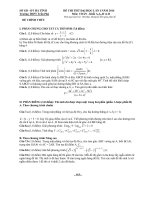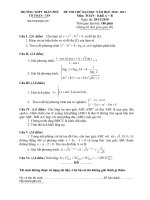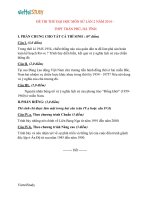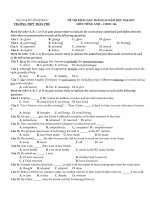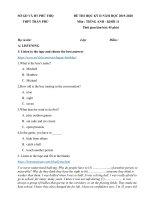Đề cương ôn tập giữa học kì 2 môn Tiếng Anh lớp 11 năm 2020-2021 - Trường THPT Trần Phú
Bạn đang xem bản rút gọn của tài liệu. Xem và tải ngay bản đầy đủ của tài liệu tại đây (248.1 KB, 8 trang )
SỞ GIÁO DỤC VÀ ĐÀO TẠO HÀ NỘI
TRƯỜNG THPT TRAN PHU – HOAN KIEM
I. TOPICS :
NỘI DUNG ÔN TẬP GIỮA KỲ II
Môn: Tiếng Anh
Khối : 11
Năm học 2020-2021
1. Global warming
2. Further education
3. Our world heritage
II. GRAMMAR
1. Present perfect
2. Present perfect continuous
3. Present gerund and Perfect gerund
4. Present participle and Perfect participle
III. WRITING:
1. Write an essay about the causes and effects of global warming and solutions.
2. Write an email asking for information about higher education.
3. Write an essay about the reasons why …..
IV. PRONUNCIATION:
1. Strong and weak forms of words in connected speech.
2. Contracted forms nouns / pronouns, etc. + verbs; verbs + not.
3. Linking between a consonant and a vowel.
4. Elision of weak vowels before /l/, /n/, and /r/.
5. Falling and rising intonation.
V. TYPES OF EXERCISES:
1. Phonetics: Pronunciation & Stress.
2. Multiple choice/ choose the best answer.
3. Fill in each numbered blank with one suitable word or phrase.
4. Give the correct form of the given words to complete the following sentences
5. Reading comprehension. (T/F exercise and answer the questions)
6. Rewrite sentences.
7. Write a letter or complete the sentences based on the given words and phrases.
EXERCISES
A. PHONETICS
Choose the word in each group that has the underlined part pronounced differently from the rest.
1.
A. guitarist
B. fare
C. narrative
D. careful
2.
A. complain
B. won
C. condition
D. profession
3.
A. bench
B. attend
C. educate
D. subject
4.
A. romantic
B. mature
C. mathematics
D. humanity
5.
A. shyness
B. reply
C. multiply
D. syllable
6.
A. desks
B. rulers
C. bags
D. pens
7.
A. minute
B. muddy
C. funny
D. number
8.
A. born
B. world
C. fork
D. short
9.
A. died
B. continued
C. contented
D. followed
10.
A. invited
B. decided
C. wanted
D. watched.
11.
A. routine
B. literature
C. decisive
D. fifty
12.
A. peasant
B. appeal
C. reason
D. teapot
13.
A. exactly
B. immediate
C. pretty
D. become
14.
A. field
B. ready
C. three
D. people
15.
A. typical
B. family
C. bicycle
D. cycling
16.
A. disaster
B. fast
C. satisfy
D. pasture
17.
A. honest
B. honey
C. harvest
D. harder
18.
A. comfort
B. cousin
C. suffer
D. studious
19.
A. says
B. said
C. saint
D. salad
20.
A. breathe
B. breakfast
C. already
D. dreamt
II. STRESS
1. A. missionary
B. various
C. technology
D. calculate
2. A. controller
B. average
C. extensive
D. magnetic
3. A. genetic
B. arbitrary
C. division
D. volcano
4. A. atmosphere
B. ancient
C. powerful
D. appoint
5. A. confirm
B. monetary
C. policy
D. proverb
6. A. recession
B. excess
C. demand
D. regular
7. A. inflation
B. successful
C. cartoon
D. purpose
8. A. creation
B. inspiration
C. intervene
D. opportunity
9. A. throughout
B. appeal
C. resourceful
D. maximum
10. A. maintenance B. significant
C. executive
D. reluctant
11. A. accept
B. interaction
C. advancement D. untamed
12. A. undisturbed
B. another
C. pessimistic
D. epidemic
13. A. release
B. retirement
C. appear
D. implement
14. A. transform
B. exhilarate
C. precaution
D. rigorous
15. A. environment B. attention
C. adaptable
D. auditory
16. A. convey
B. describe
C. approval
D. testimony
17. A. communicate B. infect
C. descendent
D. regulate
18. A. infection
B. disaster
C. public
D. surround
19. A. unsinkable
B. effective
C. disease
D. positive
20. A. approach
B. involve
C. expose
D. garbage
B. GRAMMAR & VOCABULARY
I. Fill in the correct form (Present Perfect Simple or Present Perfect Progressive).
1. Where have you been? (you/ play) ___________________ tennis?
2. Look! Somebody (break) ___________________that window.
3. You look tired. (you/ work) ___________________hard?
4. "(you/ ever/ work) ___________________in a factory?" "No, never."
5. "Liz is away on holiday." "Is she? Where (she/ go) ___________________?”.
6. My brother is an actor . He (appear) ___________________ in several films.
7. "Sorry I'm late". "That's all right . I (not/ wait) ___________________long?"
8. "Is it still raining?" "No, (it/ stop) ___________________".
9. I (lose) ___________________ my address book . (you/ see) ___________________it?
10. I (read) ___________________the book you lent me, but I (not/ finish) it yet. It's very interesting.
11. I (read) ___________________the book you lent me, so you can have it back now.
II. Present gerund vs. perfect gerund and present participle vs. perfect participle
a. Choose the best answer.
1. Tom was accused ____________some top secret document.
A. to steal
B. of having stolen
C. for stealing
D. to have stolen
2. No one can prevent us _________ good things.
A. to do
B. from doing
C. of doing
D. in order to do
3. Mary said, "I regret ____________ him earlier in my life."
A. to meet
B. not having met
C. to have met
D. at meeting
4. After ____________ it, please return the form to us in the envelope provided.
A. to complete and sign
B. you are completing and signing
c. completing and sign
D. completing and signing
5. In addition to ____________ , I do the washing up.
A. I prepare dinner
B. I am preparing dinner
c. prepare dinner
D. preparing dinner
6. Martin denied __________ the accused man on the day of the crime.
A. to see
B. of having seen
C. to have seen
D. having seen
7. She often thinks carefully ___________ any question.
A. before answering
B. before having answered
c. by answering
D. having answering
8. He never admits __________ wrong.
A. to being
B. of being
C. to be
D. to have been
9. _________ from the horseback, he was taken to hospital and had an operation.
A. When falling
B. As he was fallen
c. After having fallen
D. To fall
10. I regret ___________at his side during his illness last winter.
A. was not
B. have not been
C. not being
D. not to be
11. I tried __________ the window, but it seemed __________.
A. having opened / not working
B. opening / not to work
c. having opened / did not work
D. opening / was not working
12. We are talking ____________ Canada for our vacation next month.
A. about having gone
B. going
c. about going
D. to go
13. Sue is in charge ___________ the meeting
A. to organize
B. to have organize
c. of organizing
D. of having organized
14. By the time their baby arrives, the Johnson hope _________ painting and decorating the new nursery.
A. having finished
B. to have finished
c. having been finished
D. to have been finished
15. I suppose you also deny _______ with Nicole Auger in your office yesterday afternoon.
A. meeting
B. of having met
c. to have met
D. having met
16. ________, he went into his office to fill in the daily time sheet.
A. Before leaving
B. Before he had left
c. Before having left
D. When he is leaving
17. I am used to ______ with the window open.
A. sleep
B. sleeping
C. having slept
D. slept
18. We decided not to travel, ________ the terrible weather forecast.
A. having heard B. to have heard
C. having been heard
D. to have been heard
19. They object ___________ their plans at this late date.
a. to change
B. to have changed
C. to changing
D. of changing
20. She's angry about ________ to the farewell party last night.
a. not having invited
B. not to have invited
c. not having been invited
D. not to have been invited
21. Excuse me _____ late. I got stuck in a traffic jam for more than one hour
a. to being
B. for being
C. being
D. having been
22. _______ for twelve hours, I felt marvelous.
a. Having slept
B. Have slept
C. Having been slept
D. have been slept
b. Complete the sentences or exchanges with the present participle (V-ing) or the perfect participle
(Having + PII) of these verbs.
make, prepare, hope, believe, arrive, fail, infuriate, play
1. _______ all the preparations, the sport committee decided to start the games.
2. _______ at the airport, the athletes were warmly greeted by their fans.
3. A: Did you do well at the quiz contest last week?
B: We were quite successful, _______ everything for it.
4. A: Will you enter the next singing contest?
B: _______ twice, I don't want to try again.
5. A: Do you think you will succeed in the next writing contest?
B: I have tried hard, _______ to succeed this time.
6. _______ that she had had enough training, Linh entered the contest with confidence.
7. A: Where are the boys?
B: They are in the field _______ soccer.
8. The _______ referee showed the player who played a foul the red card.
III. Correct word forms.
1. Fill each gap in the sentence with one word from the box
certificated, tertiary, level, admission, agency, vacant, candidates, maximum, record, original
1.
2.
3.
4.
5.
6.
7.
8.
9.
10.
There are three_________ for the president of the club.
This is only a reproduction; the_________ of this painting is in Rome.
His work is not up to a professional _________ to our disappointment.
Listen to the speaker and _________ what he says.
Ann went to university for_________ study after she graduated from high school.
His good character is adequately_________
Drivers must not exceed a _________ of 55 miles an hour.
It is not easy to find a_________ room in the city hotels during the festival.
His_________ into the hospital was delayed for lack of beds.
The employment_________ helps workers to get jobs and find workers for people who need them.
2. Give the correct forms of the words in the brackets.
1.
He filled in an _________ form for the position of clerk. (apply)
2.
He has $10,000 life_________, which his wife will receive if he dies first. (insure).
3.
You have no other_________ but to leave now. (choose).
4.
The team won by 20 points, which was a _________ victory. (decide).
5.
Daisy has fulfilled all the_________ for graduation. (require).
6.
If I could choose, my_________ is for beef rather than lamb. (prefer).
7.
He had been educated in England which accounted for his_________ in the English language.
(proficient).
8.
The challenge of_________ exploration has undergone several changes. (geography).
9.
Students return in September for the start of the new_________ year. (academy)
10. An_________ is a student in a college or university who has not yet received a degree. (graduate).
3. Use a word from the box to fit each gap
marks, work, careers, problem, ambition, lessons, university, jobs,
school, medicine
I'm not sure what I'm going to do with myself when I leave (1)_______. Next week, our class are
having a meeting with the school (2)_______ officer who they say is going to tell us all about the different
(3)_______ available. We'll also be able to ask to ask questions. I'm thinking of taking up evening class to
improve my (4)_______ in maths because my dream is to become a doctor.
Although my parents don't disagree with my (5)_______, they are doubt whether I am going to get
good enough marks to get into university to do (6)_______. But they don't want to discourage me so I think
they'll agree to the extra (7)_______. By the time I finish school, I will have formed a much better idea of
what I'd like to do, but the (8)_______ is that we are going to have to decide which subjects to study for
(9)_______ two years before we finish school. Anyway, whatever happens, I'm going to have to get down to
some hard (10)_______ if I want to achieve my aims.
4. Use a word from the box to fit each gap
work, decorations, symbol, king, well, visitors, skills, exception, places, road
The building of the Forbidden City began in 1407, the fifth year of the third (1)_______ of the Ming
Dynasty. It was finished fourteen years later in 1420. It was said that a million workers were driven into the
long-term hard (2)_______. Stone needed was carried from Fangshan, a place near Beijing. It was said that a
(3)_______ was dug every fifty metres along the road in order to pour water onto the (4)_______ in winter
to slide huge stones on ice into the city. A lot of timbers and other materials were carried from far-away
(5)_______. Ancient Chinese people showed their great (6)_______ in building the Forbidden City.
Since yellow is the (7)_______ of the royal family, it is the main colour in the Forbidden City. Roofs
are yellow, (8)_______ in the palace are painted yellow; even the bricks on the ground are made yellow.
However, there is one (9)_______. Wenyuange, the royal library, has a black roof, because it was believed
that black stood for water then and could put out fire. Nowadays, the Forbidden City is open to (10)_______
from both China and other countries.
C. READING
Read the passage and do the tasks that follow.
The Easter Island Statues
When the first sailing ship came to Easter Island in 1722, the captain and crew were afraid to
land. They saw giants looking down at them from the high cliffs. The giants didn't move, so the ship
gradually sailed closer. Finally, the sailors realized the giants were only statues. These huge carvings
have puzzled the world ever since. Who made them? How did they get there?
Easter Island is a small dot in the South Pacific Ocean. It is hundreds of miles away from the
nearest shipping route, and it is one of the most isolated places on earth. The nearest mainland is over
2,000 miles away in South America.
The biggest statue on Easter Island is over 60 feet high and weighs over 100 tons. There are
hundreds of smaller ones, about 15 feet high. All of the statues are carved from stone and some wear
stone hats. Their faces are solemn and unsmiling.
Earlier inhabitants of Easter Island carved the statues from the rocks in a volcanic crater. Next, they had
to move the statues a long distance, in some cases more than ten miles, to erect them in their present
position.
No one knows for certain how the inhabitants achieved this very difficult feat. Some scientists
say that palm trees grew on Easter Island in the past. They think the inhabitants cut the trees down and
placed the heavy statues on the tree trucks. Then groups of seventy or more people rolled the statues to
their present locations. Other scientists dispute this theory because there are no palm trees on the island
today. More importantly, the actual purpose of the statues remains a mystery. Some, at least, were
probably placed on the cliffs to prevent strangers from landing on the island.
The result, however, has been the opposite. Crowds of eager people come to gape at the statues.
Easter Island is no longer a dot on the map. It has a modern aIrport and tourists visit from all over the
world.
A Write T (True) or F (False) to the following sentences.
1. The first ship to arrive at Easter Island was a steam ship.
2. The sailors were afraid to land because they thought there were giants on the island
3.Sailing closer, the sailors realized that the giants were only statues.
4. Easter Island is very close to the mainland of South America.
5. Easter Island lies in the North Pacific Ocean.
6. There are many huge stone statues on the island.
7. The statues have smiling faces.
8. The present inhabitants of Easter Island carved the ,statues
9. There are no theories as to how the statues were placed in their present positions.
10. The statues were placed on the cliff to welcome tourists
B. Answer the questions.
1. Is Easter Island large or small ?
2. Which ocean is it in ?
3. How far away is the nearest mainland?
4. What are the statues of Easter Island made from?
5. How tall is the biggest statue?
6. How much does it weigh?
7. Can you describe the faces of the statues?
8. Where were the rocks for the statues found?
9. How far were some of the statues moved?
10. Did the present inhabitants of Easter Island carve the statues?
II. Read the passage and do the tasks that follow:
Students working for their first degree at a university are called undergraduates. When they take their
degree we say that they graduate, and then they are called graduates. If they continue studying at
university after they have graduated, they are called post-graduates.
Full-time university students spend all their time studying. They have no other employment. Their course
usually lasts for three or four years. Medical students have to follow a course lasting for six or seven
years. Then they graduate as doctors. In Britain, full-time university students have three terms of about
ten weeks in each year. During these terms they go to lectures or they study by themselves. Many
students become members of academic societies and sports clubs and take part in their activities.
Between the university terms they have vacations (or holiday periods). Their vacations are long, but of
course they can use them to study at home.
Some universities, like Oxford and Cambridge in England, are residential. This means that during the
university terms the students live in a university college or hostel or in lodgings chosen from an official
list. The university and college buildings are often very old, and amongst them are fine examples of
ancient architecture.
Other universities are non-residential. Some of the students at these universities can live in a university
hostel, but many live at home or in lodgings and have to travel daily to their lectures. Large cities often
have universities of this kind. Sometimes the students have to spend quite a lot of time on their journeys,
so they cannot join student activities as easily as students in residential universities can.
Full-time students are also called internal students, because they spend all their time at university. There
are also external students who cannot attend the university full-time but who are studying for its
examinations. They are part-time students. They have to do other work during the day, usually to earn
their living, and they study in the evening.
Exercise 1. Find words in the passage to complete these sentences.
1. A university student is called an....................when he first enters the university.
2. If he passes all his examinations, the student gets a...........................
3. A................................student spends all his time studying at the university.
4. A.......................student does not spend all his time studying at the university.
5. University holidays are also known as........................................
Exercise 2. Decide if these sentences are true (T) or false (F).
T
1.
All students stay at university for three or four years.
2.
Residential students are external students.
3.
Some students live in university colleges or hostels.
4.
Students spend all their vacation attending lectures.
5.
All students in large cities are residential students.
6.
Internal students are also called full-time students.
F
D. WRITING
I. Rewrite the sentences beginning with an appropriate participle (present, past or perfect).
1. When she saw the dog coming towards her, she quickly crossed the road.
2. If it is looked after carefully, the plant can live through the winter.
3. As I don't have a credit card, I found it difficult to book an airline ticket over the phone.
4. Keith spent a lot of time filling in job application forms because he was unemployed.
5. Because I was waling quickly, I soon caught up with her.
6. The house was built of wood, so it was clearly a fire risk.
7. I was eager to catch the bus in good time because I had been told off the day before for arriving late.
8. She didn't know where the theater was, so she asked for directions at the hotel reception.
9. As she was a nurse, she knew what to do after the accident.
10. He had spent his childhood in Oslo so he knew the city well.
II. Change the adjective clauses to adjective phrases:
1. Do you know the woman who is coming towards us?
2. I come from a city that is located in the southern part of the country.
3. The children who attend that school receive a good education.
4. The fence which surrounds our house is made of wood.
5. Be sure to follow the instructions that are given at the top of the page.
6. They live in the house that was built in 1980.
7. The papers that are on the table belong to Patricia.
8. The man who talked to the policeman is my uncle.
9. I don’t like him playing in the street. I wish we had a garden that he could play in.
10. He simply loves parities. He is always the first who comes and the last who leaves.
11. The number of students who have been counted is quite high.
12. George is the man who was chosen to represent the committee at the convention.
13. The first man who was interviewed was entirely unsuitable.
14. I have got a bottle of wine but I haven’t got anything that I could open it with.
15. The people who are waiting for the bus in the rain are getting wet.
D. WRITING: COMPLETE THE FOLLOWING SENTENCES USING THE WORDS/PHRASES
GIVEN IN THE CORRECT FORMS. You can add more necessary words.
Exercise 1:
1. I / write / ask you / some information / piece/ advice / further education.
2. I would like / know if I /eligible /apply / university programme.
3. If I pursue/ educate/ immediate, what kind / attendance mode/I choose?.
4. What/ worry /me/ most / high cost /living /London /international student.
5. Can you /explain what /type/ funding /available / international students?.
6. I would like /consult you/ cultural differences/ I should /aware /.
Exercise 2: Write a passage about Machu Picchu, one of the famous wonders of the world, using the
following suggestions.
1. I / so excited /when I receive/ letter yesterday.
2. It / great that you /plan / visit one /world heritage site/ next month
3. Machu Piechu / ancient city / Peru
4. Construction /city/ start / 1450
5. The city / 2,400 meters / above sea level
6. It cover / 13 square kilometers
7. the city / buried / jungle/ not discovered / until 1911
8. Today / Machu Picchu /one/most famous tourist attractions in all / South America
Exercise 3
1. Thanks / its ideal climate / European architecture, Da Lat / well-known national / international
tourist destination.
2. In / effort /attract more tourists, Da Lat /destroy / natural beauty / environment.
3. general plan / develop Da Lat city /approve / Prime Minister.
4. By 2030, Da Lat /the surrounding areas /be /large /than Ha Noi, /estimated population / about
750,000 inhabitants.
5. /project /aim/ improve / living conditions / local inhabitants while /preserve /urban space
/architecture works.
6. Environmental problems/ as/ fresh water shortages, waste collection, water pollution,
/deforestation /solve.
7. / “miraculous village” project/ turn Dalat / hi-tech agricultural center.
8. The aim / project /promote / production / clean /vegetable/ high quality flower/ both local and
export markets.
